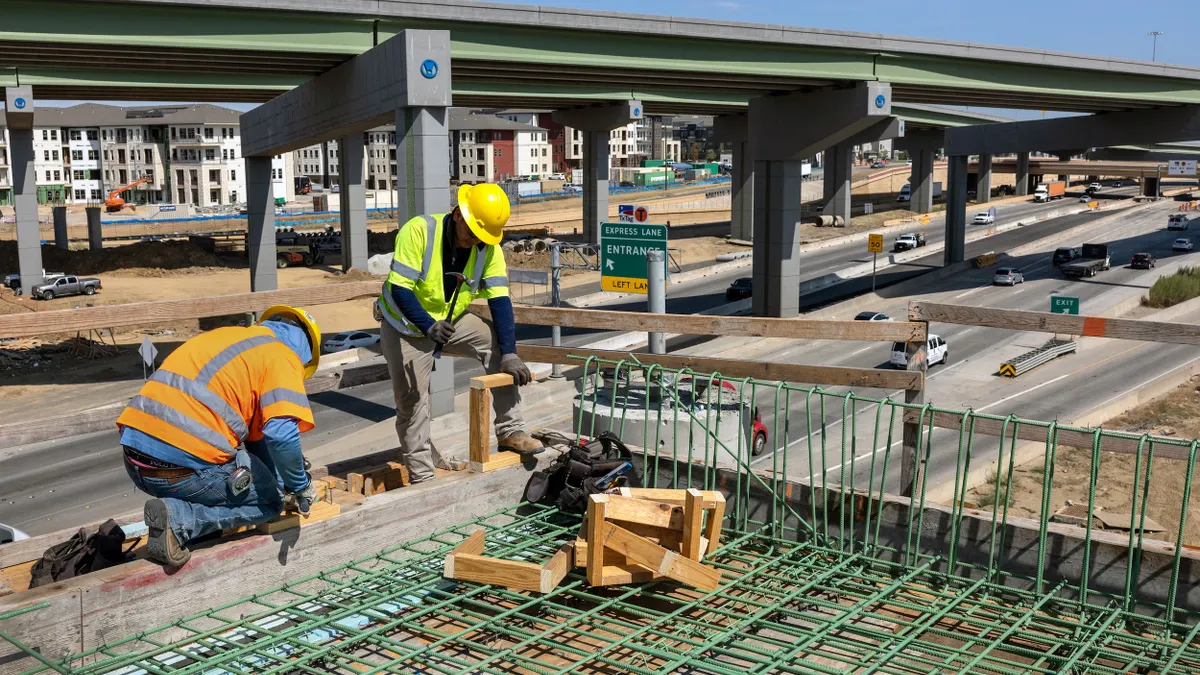Dive Brief:
-
New guidance from the Treasury Department appears to allow any U.S. firms with 500 or fewer employees to qualify for the Small Business Administration's Paycheck Protection Program regardless of revenue, according to the Associated General Contractors of America. The initiative was created as part of the $2 trillion coronavirus rescue bill enacted late last month.
-
President Donald Trump's administration released the new guidance yesterday after the AGC raised concerns that many small construction firms appeared to be excluded from the program. While Congress had earlier declared that the program be open to all businesses with 500 or fewer employees, the administration's “interim final rule” issued on April 2 stated that businesses must have 500 or fewer employees and fall below the agency’s small business size standards in order to qualify. The AGC claims the rule would have excluded many construction firms that have fewer than 500 employees but earn more than the SBA rules allow.
-
While the new Treasury Department guidance appears to clear the way for any construction firms that employ 500 or fewer people to receive the benefits, association officials said the department’s fix is, "at best, procedurally sloppy."
Dive Insight:
Specifically, the new guidance clarifies that businesses do not have to qualify as a small business concern (as defined in section 3 of the Small Business Act, 15 U.S.C. 632) in order to participate in the program.
It states that a firm is eligible for a loan if it has 500 or fewer employees whose principal place of business is in the United States, or if the business meets the SBA employee-based size standards for the industry in which it operates, if applicable.
"The association will work with administration officials to ensure that the Small Business Administration’s regulations and guidance are harmonized with this new Treasury guidance," reads an April 7 AGC statement.
Under the $349 billion initiative, U.S. small businesses are eligible for loans of up to $10 million, which will not have to be paid back if they meet certain requirements, including using 75% of the money to retain or rehire employees. Businesses can receive a $10,000 loan advance that does not have to be repaid, according to The Washington Post. Earlier this week, Treasury Secretary Steven Mnuchin asked congressional leaders for an additional $250 billion for the program, which has received overwhelming demand.
In related government news, a group of industry associations have lobbied OSHA to reconsider its position on the recordability of COVID-19 cases on U.S. jobsites. The agency guidance so far on the matter has been unclear, said a letter from leaders of the AGC, the National Association of Home Builders, Associated Builders and Contractors and the Mason Contractors Association of America to Loren Sweatt, OSHA principal deputy assistant secretary of labor.
Since the pandemic began, OSHA has stated that jobsite cases of COVID-19 should not be treated as the common cold or flu and are exempt from recordkeeping. OSHA later stated that employers must record COVID-19 when there is a confirmed case in the workplace that the employer determines is work-related and that meets the additional “general” recordability criteria contained in the rule.
The association group asked OSHA to reconsider this position and either:
- Treat COVID-19 as the common cold or flu and thus not work-related.
- Limit the application to situations where an employee contracts COVID-19 as the result of providing direct medical treatment to a person diagnosed with a confirmed case of COVID-19.
- Or require employers to log cases of COVID-19 on a separate OSHA 300 Log, which would not impact an employer’s overall Days Away, Restricted, or Transfer (“DART”) rate.
Treating confirmed cases of COVID-19 as typical illnesses under the rule has the potential to skew the national statistics on injuries and illnesses and put construction employers "in an almost impossible position of determining work-relatedness for a virus that is spread easily — like the common cold and flu — and is becoming widespread in all communities across the country," the letter reads.
While OSHA did not answer a request for comment on the matter, AGC spokesperson Brian Turmail said the associations have been told to expect guidance on the issue in the near future.














